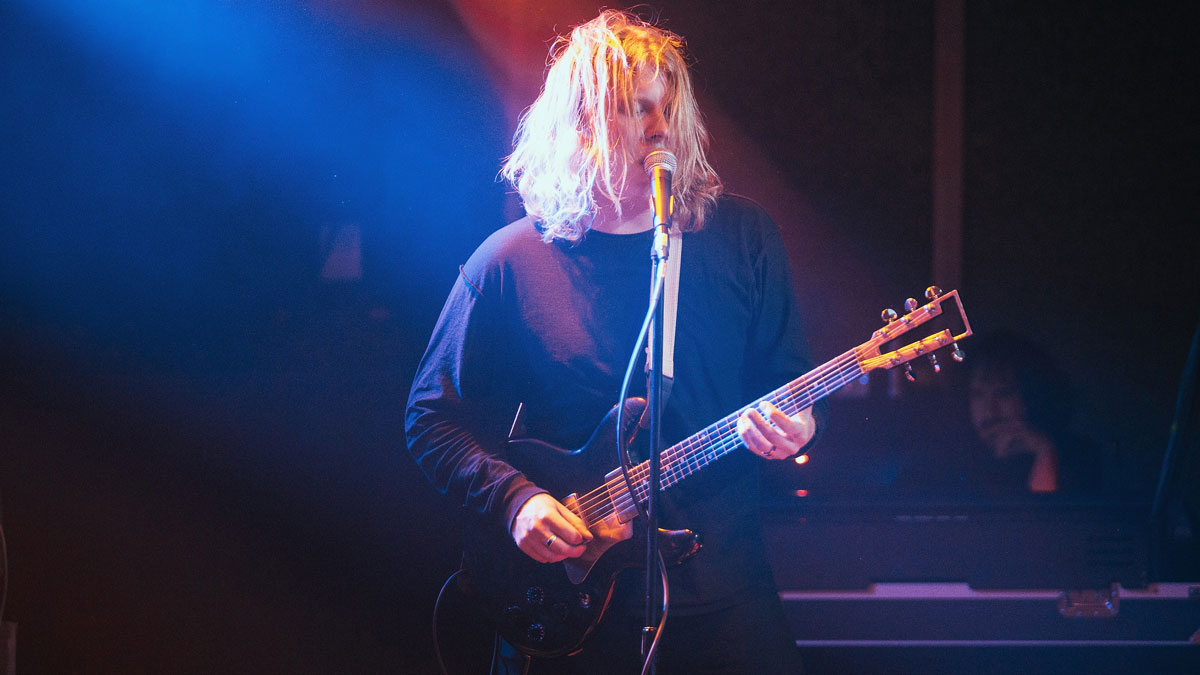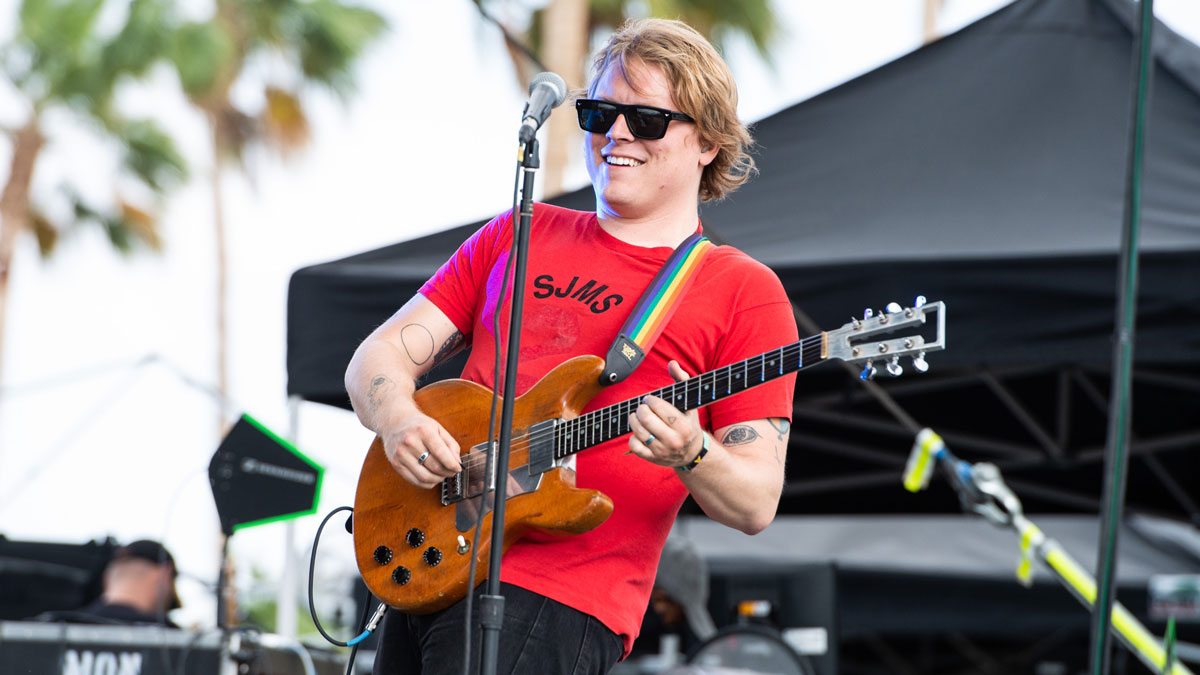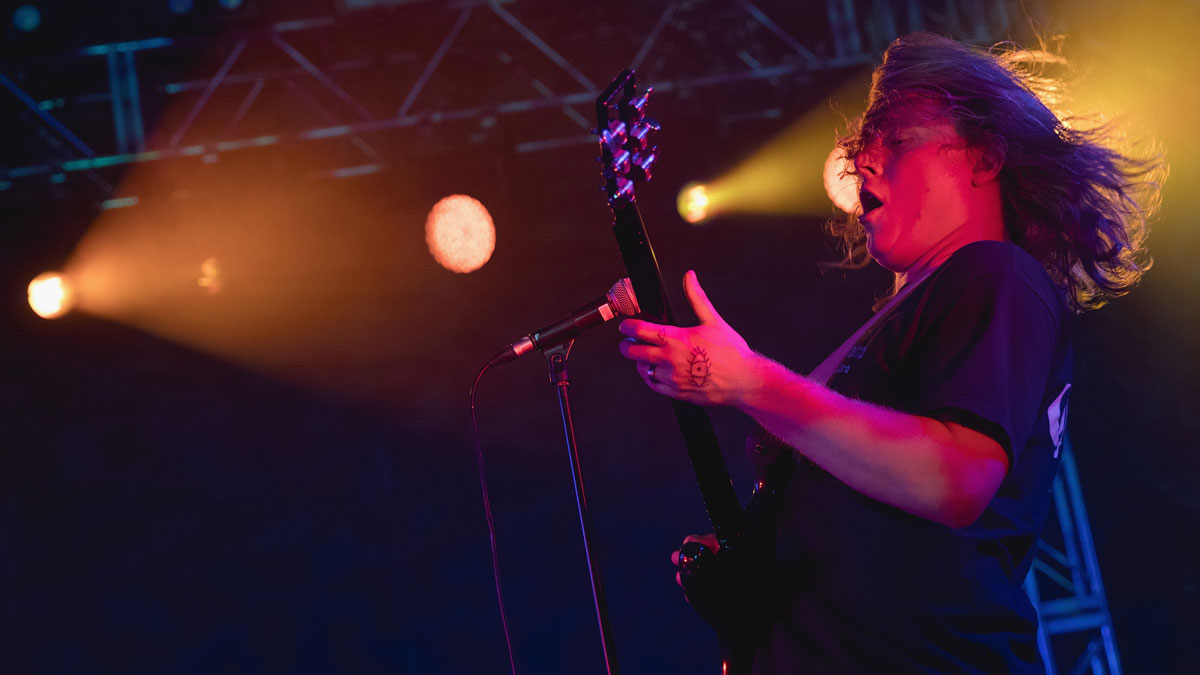Ty Segall: "I don’t like to spin out and rabbit hole on sonics. I have a rule that if you can’t make something sound good in five minutes, then you should move on"
The prolific garage-rocker on his obsession with harmonization, insatiable fuzz lust and why he wrote the guitar parts for his new album on synth

California-born rock ‘n’ roll artist, Ty Segall, released one of the best albums of the year – Harmonizer – on August 3. It’s big, rugged, varied, layered, rich with cold showers of guitar tones and bright flashes of synths. There are sounds like the colors that jolt in front of your eyes when you’re hit in the head. It’s delicious – your ears will lap it up.
Segall, who is a prolific musician, is also a prolific engineer. He’s recorded myriad artists, from La Luz to Fred Armisen. He also just completed construction on a new L.A. studio, which he also calls Harmonizer, in which he recorded his new LP.
We caught up with Segall to ask him about the album (his 13th), what he loves about his six-string, how he survived all his self-made avalanches of sound and much more.
When did you first find, hear or play the guitar? When did the instrument enter your atmosphere in a way that made you interested?
"I’ve always been into music and guitars. I was raised in a household where MTV was my babysitter, pretty much, when I was, like, an infant, a child. So, there’s no memory I have of hearing the guitar for the first time because it’s been a constant in my life.
"My parents were pretty into heavy metal, hair metal and grunge and that stuff when I was a little kid."
Did they play it around the house?
All the latest guitar news, interviews, lessons, reviews, deals and more, direct to your inbox!
"Yeah, like, all the Seattle stuff. All of it, you know? Because I was born in ’87, so it was prime time for all that stuff. I’m from the Bay – I was born in the Bay Area and then we moved to Southern California. But my mom’s favorite record is Appetite For Destruction. So, I can’t really answer [when I first heard the guitar], exactly. But I do remember what made me want to play the guitar and that was getting into punk, getting into Black Flag and the Misfits and Minor Threat and all that stuff. I was like, 'Oh, cool!' My brain understood that if you just knew a few chords you could achieve writing a song."
That’s funny because when I hear your most recent work, there are so many great layers and sounds. And I want to get to that in a second. But before we do, let me ask: how did you get better at the guitar over the years? Were there things you studied or people’s hands you stared at all the time?
"Just, I mean, my friends! I’m really lucky to be surrounded really, really incredible musicians. Charles [Moothart], who is the drummer in my band but who is the guitar player in Fuzz, he is an insane guitar player. I’ve learned a lot from him over the years. And Emmett [Kelly], the other guitar player in my band, he’s the same. We’ve really – I don’t know what I’ve shown them as a guitar player, because they definitely are superior in their technical skills.
"I might have been the first person to get Emmett to get a really loud amp and now he’s, like, addicted to it. So, maybe I turned him onto volume, which is a good and bad thing! But that’s just really my experience, just learning from my friends. Watching people in the various scenes I’ve been a part of. Like San Francisco, I got into using a fuzz pedal because I was in this band, Sic Alps and this dude, Matt Hartman, had this Fuzz War [pedal] and I was like, 'That’s so sick! It’s like a way crazier Big Muff.' There’s a lot of stuff like that.
"Getting into Music Man amps because [John] Dwyer from Thee Oh Sees ripped Music Man amps and then getting into certain types of sounds because you hear people that you’re surrounded with doing that. Or getting into certain records and being like, 'Whoa! I think Les Pauls sound pretty cool! That’s definitely a Les Paul on that record!' That sort of thing."

I know you’ve put out music with you as a member and as the front person and you’ve produced your own albums as well as those from other bands – what was the genesis of your newest LP, Harmonizer, and how, specifically, did you think about the balance of power and nuance regarding the guitar on the album?
"Well, it’s always fun to think about the guitar maybe in a way that, you know, it’s not usually used. What was really cool about Harmonizer was that the last record I did didn’t have any guitar on it. So, I was like, 'Fuck this! I want to play the guitar!'
"What was cool was originally I wrote all the songs on synths, because I have a thing that I do on guitar – you know when you play an instrument a lot, you pick it up and your hand just goes to D? I was really trying to break that. And then I would finish the songs on the guitar, by adding different parts or having the guitar be almost the auxiliary tool to finish the song. Almost like it was another vocal melody, or something. So, that was fun. Then the idea originally was not to use any amps and to find as many DI sounds.
"I’m obsessed with this Fender Quad Reverb I have, which is basically a Twin with four speakers. It’s this hybrid Frankenstein of a PV and a Fender together. It’s especially nasty. So, of course, I plugged that in and said, 'Okay, we have to use this for some stuff.' By using the different DIs and stuff – there’s like, I don’t even know how many fuzz pedals. It was like every sound we were trying to make it sound like a different voice or almost a vocal melody."
What kind of patience does that take, as you’re trying out different guitars or amps or sounds or DIs? Is there a ton of trial and error?
"I think Pictures is a good song to look at because there are basically three parts. The first part, which is like the 'most fucked up guitar sound'. And there’s the end which has all the DI different layers. Eventually, you get into a rhythm and say, like, these are the four sickest DI pedals and each one is like this one is really smooth like a green Russian Big Muff and the Hyper Fuzz Boss is super-brutal.
"And then the [Death By Audio] Fuzz War is in between. So, it’s fun but I don’t like to spin out and rabbit hole on sonics. I kind of have a rule that if you can’t make something [sound] good in, like, five minutes, then you should move on. At least, personally. Because it’s either going to sound rad or it’s not."
I imagine you as someone in a laboratory as much as you are in a studio. So, it’s heartening to hear you’re not super-duper painstaking with that stuff.
"That’s just for me. That’s my own personal rule. I’m down to let people rabbit hole but eventually I’ll be like, 'We’ve been trying to find this sound for 45 minutes. Do you think we should try something else?' [Laughs]
This was the first record you’ve done that was completed in your new studio, Harmonizer Studios. So, given your new album and the studio are named the same, what does the idea of harmony or harmonizing mean to you philosophically?
It’s a beautiful thing if you think anything can be in harmony with each other and that creates its own unique sound and its own unique chord
"Yeah, so the idea for the name was almost that – it’s funny because I have like four of those Eventide H949 Harmonizers, those effects pedals and I’m obsessed with them. What got me so obsessed with the idea of harmonizing is that I was raised and lived in a pretty normal universe of what a musical harmony is supposed to sound like. You know, like, a major chord, whatever.
"I was in a barbershop quartet in high school, funnily enough. So, I understand chords. But what was fun was messing with this effect and layering things on top of each other in a way where it’s complete noise, like, dissonance. And I just got really into the idea of that. Harmonies are anything and everything."
It’s a state of mind.
"You know. It’s a beautiful thing if you think anything can be in harmony with each other and that creates its own unique sound and its own unique chord. And that’s awesome and beautiful in it’s own way and it doesn’t need to be this 'major chord' and you can take that in any direction you want to, philosophically, and I like that as a bit of an ethos for life."

When you work with and produce other bands, how do you go into the process – how do you think about it, especially in terms of the guitar and guitar sounds when the band is featuring the instrument?
"It all depends on how much they want me to be involved, you know? I don’t want to get in the way if someone has an incredible thing. It’s like, cool, I think part of the production is just to capture that thing. But if someone comes to me and says, 'Hey man, I want you to produce my record and I want you to go as far as you want.'
"Then that opens up the door to – it’s such a cheesy thing – but to what serves the record. It’s so cliché, but it’s true. You have to have conversations with people, like, okay I have my personal taste, which is to fuck up shit and make it really extreme and affecting. I don’t like the kind of production that’s nice and balanced and simple. I like to lean into extremeness. Just because it’s fun!"
It’s memorable.
My favorite amp is my Quad Reverb. If that thing gets stolen or explodes, or something, I don’t know what I’m going to do. It would be all over
"There are so many ways to go about it. There’s nothing cooler than an insanely great player or singer that does a single vocal, a single guitar and you just turn up the guitar when it’s a solo and that rules! But at the same time, so many of my favorite records are just so stacked and layered and extreme. It just really depends.
"But I do have my favorite guitar, my favorite amps and my favorite pedals. And I love how that sounds. So, sometimes, I’m like, 'You should use my stuff.' Because I like how that sounds."
When it comes down to your favorite gear – guitar, pedals, amp – if you could have one each on a desert island, so to speak, what would you choose?
"Yeah, my Travis Bean. My TB1000 is the greatest guitar of all time, for me. A close second is my Les Paul. But if I could pick one it would be the Travis Bean. And if I could pick one pedal at this exact moment, I would pick my Hyper Fuzz because it’s the nastiest one I have.
"But at the same time, that’s harder because all of those pedals do something different. And then my favorite amp is my Quad Reverb. If that thing gets stolen or explodes, or something, I don’t know what I’m going to do. It would be all over."
One more question about Harmonizer – was there a favorite occurrence, revelation, experience you had while making it?
"I’m really proud of the song with my wife, Denée, where she sings – the song is Feel Good. I think that’s a different song for so many reasons. Her voice is so great on it and she wrote the lyrics and they’re fucking awesome and super-positive and great. I think musically it’s a different kind of song that I don’t think I’ve really done before and, yeah, I’m just really proud of that one. She’s such a great lyricist."
What do you love most about playing guitar and making the music you make with it?
"Well, selfishly, and I kind of can’t even do this anymore, because it’s not very healthy, is the volume. That’s what I think I got addicted to was standing in front of a stack of amps with a guitar and it just rattling your whole body and having it be this almost church-like thing.
"I specially got into going to shows because – I’m not a religious person, but going to a show is the closest I’ve felt to feeling like there is some sort of higher thing connecting us. You know, this is obviously from the perspective of a young person who I’m talking about right now, but it’s pretty amazing the communal experience of being at a show and sharing the power of something like volume that shakes everyone and literally moves their body."
- Harmonizer is out now via Drag City.
![B.B. King [left] cups his hands to his ear as he asks the crowd for more. Joe Bonamassa, with a Les Paul, gives his crowd a thumbs up](https://cdn.mos.cms.futurecdn.net/P3XrQLh86C27JfPp4AGp6n.jpg)